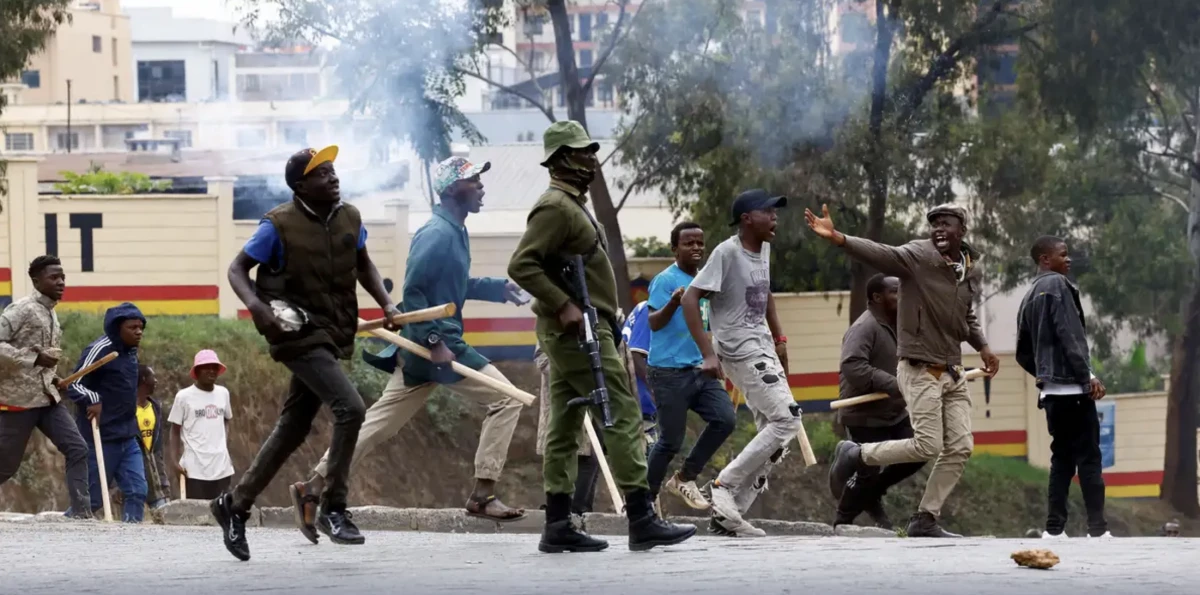OPINION: Who should be held responsible when protests turn violent?

Youth armed with crude weapons unleash terror on protesters as a policeman watches. On Tuesday, June 17, hired goons attacked and injured peaceful protesters who were demanding justice for the death of teacher, blogger Albert Ojwang at the hands of the police. Photo I Reuters

Audio By Carbonatix
The nature of protests in Kenya has changed. The aftermath of the June 25, 2025 and Saba Saba protests in Kenya poignantly illustrates this critical turning point.
Instead of peaceful and lawful demonstrations, gangs of violent youth descended on both public and private property with abandon, in what appeared to be coordinated attacks, leaving a trail of destruction in their wake.
This was evident across all counties where demonstrations took place, but more so in areas such as Kikuyu, Gilgil, Matuu, and Ol Kalou, which bore the brunt of the unprecedented chaos, looting and destruction.
In Kikuyu town, protesters torched the Kikuyu Law Courts and stormed police stations, also lighting bonfires within government offices, inflicting severe damage to county property.
Similarly, in Matuu, the police station came under attack, with government property, including police vehicles, destroyed by arson and looting. Gilgil also faced similar violent disruptions. However, Ol Kalou, in Nyandarua County, stands out as one of the most severely affected towns, with destruction on an unprecedented scale.
The town experienced serious unrest where the divisional headquarters was set ablaze, with widespread injuries and property damage reported.
24 motor vehicles and two motorcycles belonging to the County Government of Nyandarua, valued at approximately Ksh.300 million, were set ablaze.
Additionally, eight key government buildings were unlawfully destroyed, including the County Administration Office, County Enforcement Offices, Sub County Youth Offices, Ol Kalou County Library, Department of Revenue Storage Unit, Department of Trade, Weights and Measures Office, Sub County Public Health Offices, and the County Public Service Board Storage Unit. The total value of these buildings is estimated at over Ksh.500 million.
This does not take into account the dozens of private businesses destroyed through looting and arson, with losses amounting to hundreds of millions of shillings.
In all these towns, the pattern of government and security installations being targeted remains consistent, and the damage predominantly involves county government offices, judicial facilities, police stations, health centres, public vehicles, and infrastructure vital to community services and security.
These attacks have significant social and economic repercussions, including loss of critical government infrastructure, disruption of essential services and local governance, and ultimately intimidating and harming the local populations that rely on these assets.
Police reports also confirmed 11 fatalities during the Saba Saba protests, in addition to dozens injured, among them 52 police officers and 11 civilians. This underscores the high human and material costs of protests gone awry.
Is it any wonder, then, that the government has launched a crackdown on the criminal elements to bring to account those responsible for the destruction?
So far, over 500 individuals have been arrested in connection with the demonstrations, out of which there have been more than 448 charges, including arson, malicious damage to property, and incitement to violence.
Most notably, 44 suspects face terrorism charges under the Prevention of Terrorism Act, underscoring the government’s position that acts like arson and coordinated property destruction have crossed into the realm of terrorism. Specifically, 3 suspects in Gilgil, 5 in Ol Kalou, 10 in Matuu and 26 in Kikuyu were arraigned in court over the violent demonstrations.
This crackdown has been buoyed by Kenya’s designation of arson as a terrorist act, elevating the gravity of such offences and the consequent penalties.
The courts have also become stringent, with high bail thresholds, recognising the strategic gravity of these offences.
Given the massive economic costs- stripping thousands of hardworking Kenyans, including entrepreneurs, of their hard-earned livelihoods- is it unfair to treat arson as terrorism?
It can be argued that the economic losses due to just these past two protests are much bigger than the total losses occasioned by terrorists in the past five years. What is it then, if not economic terrorism?
While the right to protest is enshrined in the Constitution, it contains an important caveat- such protests must be peaceable.
As the legal adage goes, one person’s rights end where another’s begin. It behoves the state, therefore, acting as custodian, guarantor and implementer of those rights, to ensure the critical balance remains.
This is why organisers should be held liable for damages caused by violent protests. It is also why destructive protesters must be charged accordingly before a court of law to account for the losses incurred.
For the sake of the myriad businessmen and women who have put their life savings into their biasharas only to lose them in a moment of violence. This is for the sake of the many previously employed Kenyans who sank into redundancy, and millions more are at risk with the destruction of businesses.
Of all citizens and taxpayers relying on critical government services, who would be grossly affected by the destruction of public facilities, of the millions supported by local economies, those willfully targeting and destroying our property should not be let to go Scot free because they endanger our collective prosperity and stability.
For their sake, let the law take its due course, so that the innocent suffer no more, but the guilty are brought to book and justice is served.
Anna Wanjiru Wachira is a security analyst based in Berlin, Germany. She holds a Master's Degree in African Governance and is a PhD student in Peace & Security majoring in Counterterrorism


Leave a Comment